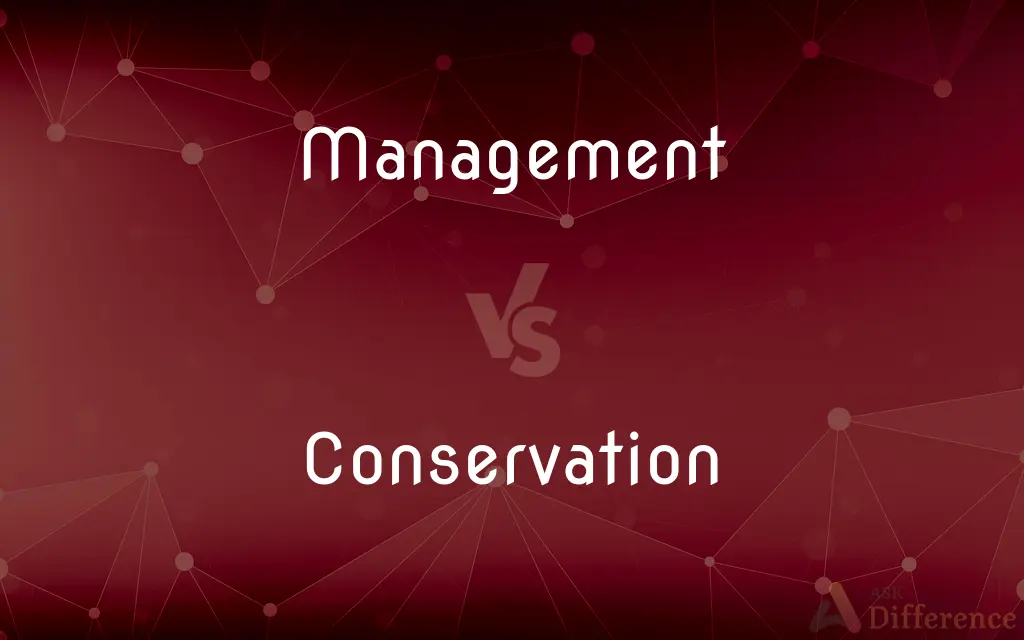Management vs. Conservation — What's the Difference?
Edited by Tayyaba Rehman — By Maham Liaqat — Updated on April 22, 2024
Management involves overseeing and administering resources or systems, focusing on efficiency and effectiveness; conservation aims to protect and sustain natural resources, emphasizing preservation and sustainable use.

Difference Between Management and Conservation
Table of Contents
ADVERTISEMENT
Key Differences
Management generally refers to the practice of administering and controlling resources, activities, or organizations to achieve specific goals. It often involves planning, organizing, staffing, directing, and controlling an entity. Conservation, on the other hand, is specifically concerned with the preservation, protection, and careful use of natural resources to prevent their depletion or destruction.
In management, the primary focus is on maximizing efficiency and effectiveness in achieving the objectives of an organization or system. This can apply to various fields such as business, public administration, and technology. Whereas conservation centers on sustainable practices and the ethical stewardship of environmental resources like wildlife, forests, and water to ensure they remain beneficial for future generations.
Management strategies are typically designed to enhance productivity and foster growth within an organization or system. They are applied in a broad spectrum of areas ranging from human resources to project and financial management. Conservation strategies, however, are tailored towards maintaining ecological balance, preserving biodiversity, and promoting the sustainable use of ecosystems.
A key aspect of management is its applicability to both renewable and non-renewable resources, focusing on optimal use to meet human needs and organizational goals. Conservation is primarily concerned with renewable natural resources, advocating for their sustainable management to maintain environmental health and resilience.
While management often deals with immediate goals and short-term achievements, conservation is inherently long-term in its approach. It emphasizes the future availability and health of natural resources, often requiring foresight and planning that spans decades.
ADVERTISEMENT
Comparison Chart
Focus
Efficiency and effectiveness
Preservation and sustainable use
Primary Concern
Resource usage and organizational goals
Protection of natural resources
Strategy Purpose
To enhance productivity and growth
To maintain ecological balance
Resource Type
Both renewable and non-renewable
Mainly renewable
Time Orientation
Often short-term
Long-term
Compare with Definitions
Management
The group of people responsible for running an organization or area.
The management team meets weekly to discuss progress.
Conservation
The practice of reducing the use of resources to prevent waste.
Energy conservation is vital for sustainable living.
Management
The process of dealing with or controlling things or people.
Effective management is crucial for any organization's success.
Conservation
Activities aimed at maintaining natural habitats and preventing the depletion of resources.
Conservation projects often involve community participation.
Management
The organization and coordination of activities to achieve defined objectives.
Project management involves careful planning and execution.
Conservation
The sustainable management and use of natural resources.
Water conservation is becoming increasingly important in urban areas.
Management
The skill of organizing and making decisions.
Good management is often a predictor of business success.
Conservation
The scientific study of the protection and management of biodiversity.
Conservation biology is a rapidly developing field.
Management
The act of administrating resources in an organization.
Financial management is key to maintaining profitability.
Conservation
The preservation, protection, and restoration of the natural environment and wildlife.
Conservation efforts have increased the population of endangered species.
Management
Management (or managing) is the administration of an organization, whether it is a business, a non-profit organization, or a government body. Management includes the activities of setting the strategy of an organization and coordinating the efforts of its employees (or of volunteers) to accomplish its objectives through the application of available resources, such as financial, natural, technological, and human resources.
Conservation
The act or process of conserving.
Management
The process of dealing with or controlling things or people
Businesses were slow to adopt the key elements of environmental risk management
The management of the economy
Conservation
Preservation or restoration from loss, damage, or neglect
Manuscripts saved from deterioration under the program of library conservation.
Management
Trickery; deceit
If there has been any management in the business, it has been concealed from me
Conservation
The protection, preservation, management, or restoration of wildlife and of natural resources such as forests, soil, and water.
Management
The act, manner, or practice of managing; handling, supervision, or control
Management of factory workers.
Conservation
The maintenance of a physical quantity, such as energy or mass, during a physical or chemical change.
Management
The person or persons who control or direct a business or other enterprise.
Conservation
The act of preserving, guarding, or protecting; the keeping (of a thing) in a safe or entire state; preservation.
Management
Skill in managing; executive ability.
Conservation
Wise use of natural resources.
Management
(uncountable) administration; the use of limited resources combined with forecasting, planning, leadership and execution skills to achieve predetermined specific goals.
Conservation
(biology) The discipline concerned with protection of biodiversity, the environment, and natural resources
Management
The executives of an organisation, especially senior executives.
Conservation
(biology) Genes and associated characteristics of biological organisms that are unchanged by evolution, for example similar or identical nucleic acid sequences or proteins in different species descended from a common ancestor
Management
(uncountable) Judicious use of means to accomplish an end.
Excellent time management helped her succeed in all facets of her life.
Conservation
(culture) The protection and care of cultural heritage, including artwork and architecture, as well as historical and archaeological artifacts
Management
The act or art of managing; the manner of treating, directing, carrying on, or using, for a purpose; conduct; administration; guidance; control; as, the management of a family or of a farm; the management of a business enterprise; the management of state affairs.
Conservation
(physics) lack of change in a measurable property of an isolated physical system (conservation of energy, mass, momentum, electric charge, subatomic particles, and fundamental symmetries)
Management
Business dealing; negotiation; arrangement.
He had great managements with ecclesiastics.
Conservation
The act of preserving, guarding, or protecting; the keeping (of a thing) in a safe or entire state; preservation.
A step necessary for the conservation of Protestantism.
A state without the means of some change is without the means of its conservation.
Management
Judicious use of means to accomplish an end; conduct directed by art or address; skillful treatment; cunning practice; - often in a bad sense.
Mark with what management their tribes divideSome stick to you, and some to t'other side.
Conservation
An occurrence of improvement by virtue of preventing loss or injury or other change
Management
The collective body of those who manage or direct any enterprise or interest; the board of managers.
Conservation
The preservation and careful management of the environment and of natural resources
Management
The act of managing something;
He was given overall management of the program
Is the direction of the economy a function of government?
Conservation
(physics) the maintenance of a certain quantities unchanged during chemical reactions or physical transformations
Management
Those in charge of running a business
Common Curiosities
What are common strategies used in conservation?
Common strategies include habitat restoration, legal protection of species, and promoting sustainable resource use.
What is the primary goal of management?
The primary goal of management is to optimize efficiency and effectiveness in achieving organizational or systemic goals.
What distinguishes management from conservation in terms of resource focus?
Management can focus on both renewable and non-renewable resources, whereas conservation primarily focuses on renewable natural resources.
How does conservation impact biodiversity?
Conservation plays a critical role in protecting and enhancing biodiversity by preserving natural habitats and species.
What roles do management professionals play in conservation?
Management professionals in conservation focus on planning, executing, and monitoring conservation projects and strategies.
Can principles of management apply to conservation efforts?
Yes, management principles such as planning, organizing, and controlling can be adapted to improve the effectiveness of conservation programs.
How does management address resource scarcity?
Management addresses resource scarcity through strategies aimed at efficient resource use, allocation, and planning for sustainability.
How are management and conservation similar?
Both fields require planning, strategic decision-making, and goal-oriented approaches to be effective.
How do conservation efforts benefit humans?
Conservation efforts benefit humans by ensuring the sustainability of natural resources that are essential for life and economic activities.
What are the economic implications of conservation?
Conservation can have positive economic implications by preserving ecosystems that support tourism, fisheries, and agriculture, which are critical for many economies.
Share Your Discovery

Previous Comparison
Oak vs. Mott
Next Comparison
Happy vs. ProudAuthor Spotlight
Written by
Maham LiaqatEdited by
Tayyaba RehmanTayyaba Rehman is a distinguished writer, currently serving as a primary contributor to askdifference.com. As a researcher in semantics and etymology, Tayyaba's passion for the complexity of languages and their distinctions has found a perfect home on the platform. Tayyaba delves into the intricacies of language, distinguishing between commonly confused words and phrases, thereby providing clarity for readers worldwide.
















































